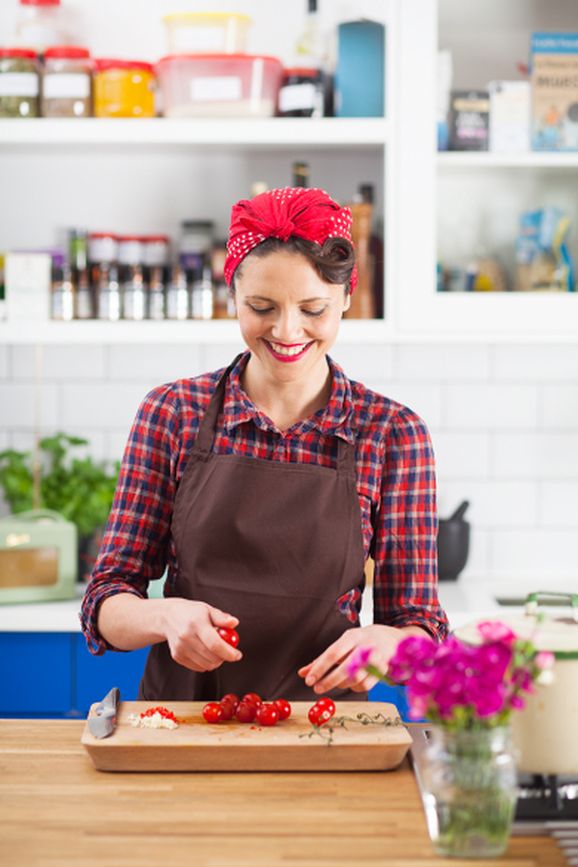When Olia Hercules set about collecting recipes for her new cookbook Mamushka, it was more than just a collection of family recipes, it was a means of preserving generations of tradition that were at risk of being forgotten.
Hercules grew up in Southern Ukraine, and while the Soviet Union suppressed local culture, she recalls how her grandparents’ home was a rich haven of food, informed by a mixed heritage of Ukraine, Moldova, Russia and central Asia.
But it’s not just history that inspires Hercules’ dishes. Ingredients from her home in the UK often make an appearance, and there’s a touch of Ottolenghi –her previous workplace – in her seasoning and presentation.
I catch up with Hercules after a live cooking demonstration at the Manchester Food and Drink Festival. There’s dumplings steaming on the hob as we speak, and it’s clear from how delicately she folded the dough into perfect stars she’s enamored by the beauty of Ukranian food, and keen to dispel the myths of stodge that surround it.
So tell me about the style of home cooking where you grew up…
My home really inspired me – my granddad and grandma they were such good cooks. She had six children, she had a cow, she had a goat, she was growing stuff… I don’t know how she did it! It’s crazy.
You know when you were a teenager and you just thought – ah I don’t wanna go see my grandma. Now I really wish I spent more time with her and had these conversations. I still have my Siberian grandma, and when we meet we sit down and I ask her about things and she tells me stories. It’s really heartbreaking, some of the stuff that she remembers. I don’t know they did it. And they still managed to cook all of this amazing food.
But I’ve had loads of influences. You think of Ukrainian food being all dumplings, but it varies. So in Western Ukraine it is a little bit closer to Polish food, but down south we have all these Mediterranean influences. So Moldovan food almost has Greek flavours. My family is my inspiration.
But I also studied Italian at university and I lived there for a year, in a place on the ‘calf’ of Italy, and I lived in Sicily as well. That’s when it just came to me, I was like ‘oh my god, I’m really obsessed with food!’
So was that a real turning point for you?
That was it. You know when you grow up with amazing food you don’t really appreciate it. It was last year that I just went, wait a minute, I’m a chef, and I’ve been doing this for so long and actually Ukrainian food is amazing.
Part of the reason for that is the ingredients as well. Ingredients are so important, and I think that’s why, for a long time I didn’t really cook any Ukranian food in London because I thought that I’d have to spend loads of money to get those ingredients, but actually you don’t.
The ingredients are easy to source, there’s a couple of things that you use for fermentation that’s a little but harder to get, like the dill blossom for example, or horseradish leaves, but if you have a friend with an allotment I’m sure that they’d have those things.
And you don’t really need them, you can always substitute them for other flavorings that you like. I think recipes shouldn’t be prescriptive. As in, you can change it and make it work for you and your lifestyle.
You know, rhubarb grows in Ukraine, but for some reason we don’t really use it. And now in Britain, I’m just crazy about rhubarb –it’s such a beautiful thing. Britain introduced me to a lot of ingredients and a lot of cooking techniques, so it’s nice to merge these two worlds together.
Are these recipes modernized from those you learnt from your family?
The way I see it, the way to preserve traditions is through modernization. I haven’t played around with my grandma’s recipes too much, but it’s kind of modifying how you serve it, or finding new ways to interpret it.
There’s all these books on Ukrainian food but it’s all just really old school. What makes food interesting is finding those interpretations, and fusing – I know fusion is a word that everybody hates – but it’s interesting to bring in a little bit of Britain. I’ve been here for fourteen years now, it’s my home, so I love bringing a little bit of British influence into my food. I always like an input, from wherever I go, whoever I meet, it’s always nice to inject something into it.
So when I went to Leeds, for example, they have this place called Bundobust. Isn’t it fantastic! They brought me some for lunch and I just thought – my god this tamarind chutney is amazing! And I added it to one of my dishes. It went well with the beetroot and the salad so we had a Ukrainian feast but with this little addition. It’s a story – food is like a story.
A recipe can be a recipe but if there’s something a little bit more behind it I think it makes it better.
That’s how the stories -or recipes- stay alive, through readapting?
Exactly, and also I think to keep young people interested in it. Some say “oh god, that old dumpling again”, but if you put some crispy shallots and jushe it up with presentation... I think especially with my dinners, take the green borscht for example. It’s like a sorrel broth basically – fresh broth with green sorrel and fresh herbs, and the waiter comes over the pours the broth over. Something like a little bit of theatre maybe. So the borscht still tastes like my childhood but the presentation is a little bit different.
Was that an aim of yours – to preserve traditions when you set out writing this book?
Yes definitely. So last year, when all of the stuff started kicking off in Ukraine, especially when Crimea was annexed because we literally live there, on the border with Crimea. It was a really scary time. That was before the book or anything, I just Skyped my mum and I said we need to get these recipes down. For some reason there was just this urgency, I thought- I’m just so scared of loosing it - you know? So then we made a list and started writing these recipes down. And rediscovering things! For example the fermented passata – my grandma used to do it but my mum had stopped doing that. Then my auntie remembered and she told me how back in the day they used to ferment the tomato pulp. And I just thought – wow, this is so interesting. So now I do it myself, winter borscht with a little bit of that fermented tomato pulp is just incredible.
As a lady said before (in the audience at the Manchester Food and Drink Festival) the younger generations here they don’t really cook, so I’m really hoping the book will inspire people – Ukrainians and non-Ukrainians - to cook and to rediscover their own heritages. I think its really important and so interesting to find out your own story.


